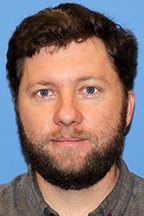A recent “MTSU On the Record” radio program explored the purifying properties of the durable sea sponge with the help of a university researcher.

Dr. Cole Easson
Host Gina Logue’s interview with Dr. Cole Easson, a lecturer and research assistant professor in the Department of Biology, first aired Dec. 17 on WMOT-FM Roots Radio 89.5 and www.wmot.org. You can listen to their conversation above.
With a grant of more than $600,000 from the National Science Foundation, Easson and researchers from other institutions will perform field work off the coast of the Caribbean island of Curacao in summer 2020.
Their primary goal will be learning more about how sponges contribute to the coral reef ecosystem and how their filtration systems affect ocean water and the nutrients in it.
“We have this apparatus that sticks a little bitty tube inside a sponge, and it samples just the water coming out of it,” Easson said.
 “I’ll actually look at the microbial community (in the water) to see if we get different microbes that are doing different types of nutrient transformations.”
“I’ll actually look at the microbial community (in the water) to see if we get different microbes that are doing different types of nutrient transformations.”
Easson said while other ocean creatures also filter water, sea sponges are unique because they’ve been in existence for some 600 million years, according to some estimates.
And that means they’ve had a long time to refine their filtration systems, he said.
To hear previous “MTSU On the Record” programs, visit the searchable “Audio Clips” archives at www.mtsunews.com.
For more information about the radio program, contact Logue at 615-898-5081 or WMOT-FM at 615-898-2800.

COMMENTS ARE OFF THIS POST